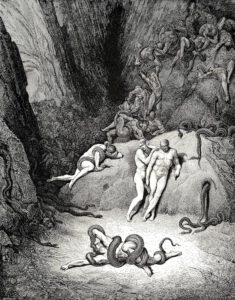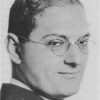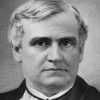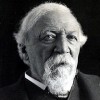In fact, “atheism” is a term that should not even exist. No one ever needs to identify himself as a “non-astrologer” or a “non-alchemist.” We do not have words for people who doubt that Elvis is still alive or that aliens have traversed the galaxy only to molest ranchers and their cattle. Atheism is nothing more than the noises reasonable people make in the presence of unjustified religious beliefs.
Sam Harris (b. 1967) American author, philosopher, neuroscientist
Letter to a Christian Nation (2006)
(Source)
Quotations about:
disbelief
Note not all quotations have been tagged, so Search may find additional quotes on this topic.
If there be any man who derides the unseen world, let him consider the death of Pentheus, and acknowledge the gods.
[εἰ δ᾽ ἔστιν ὅστις δαιμόνων ὑπερφρονεῖ,
ἐς τοῦδ᾽ ἀθρήσας θάνατον ἡγείσθω θεούς.]Euripides (485?-406? BC) Greek tragic dramatist
Bacchæ [Βάκχαι], l. 1325ff [Cadmus/κάδμος] (405 BC) [tr. Vellacott (1973)]
(Source)
(Source (Greek)). Alternate translations:
If any impious mortal yet contemns
The Powers celestial, let him view the death
Of Pentheus, to convince him there are Gods.
[tr. Wodhull (1809)]
If anyone scorns the gods, let him look to the death of this man and acknowledge them.
[tr. Buckley (1850)]
O if there be he who scorneth the great gods,
Gaze on this death, and know that there are gods.
[tr. Milman (1865)]
If there be one who still disdains the gods,
Let him behold this corpse and reverence them.
[tr. Rogers (1872), l. 1293ff]
Ah! if there be any man that scorns the gods, let him well mark this prince’s death and then believe in them.
[tr. Coleridge (1891)]
If any man there be that scorns the Gods,
This man's death let him note, and so believe.
[tr. Way (1898)]
Oh, whoso walketh not in dread
Of Gods, let him but look on this man dead!
[tr. Murray (1902)]
If there is still any mortal man
who despises or defies the gods, let him look
on this boy's death and believe in the gods.
[tr. Arrowsmith (1960)]
If there is any man who despises deity
let him look on Pentheus’ death, and judge that gods exist!
[tr. Kirk (1970)]
If any man thinks light of the divine ones,
let him consider this man’s death, and believe in gods.
[tr. Neuburg (1988)]
If there be any man who challenges or scorns
the unseen powers,
let him look on this boy's death and accept
that which is God.
[tr. Cacoyannis (1982)]
If there is anyone who despises the gods,
Looking on this death, let him believe.
[tr. Blessington (1993)]
So if there is anyone who disdains the gods
let him look at the death of this man here and let him believe that gods exist.
[tr. Esposito (1998)]
If there is anyone who despises the divine,
he should look at this man's death and believe in gods.
[tr. Woodruff (1999)]
Anyone who feels
Superior to the gods should study this:
Pentheus is dead -- believe in the gods!
[tr. Gibbons/Segal (2000)]
If there is anyone who thinks nothing of heaven's power, let him look at this man's death and believe that the gods exist.
[tr. Kovacs (2002)]
Let he who would defy the gods’ demands
Look at this piteous death and believe.
[tr. Teevan (2002)]
If there’s anyone who insults the gods let him turn his eyes to this and let him believe.
[tr. Theodoridis (2005)]
If there is anyone here who casts a disparaging eye
Upon the Divine, look now on this and know the Gods exist.
[tr. Valerie (2005)]
If there's a man who disrespects the gods,
let him think about how this man perished --
then he should develop faith in them.
[tr. Johnston (2008)]
If anyone still disputes the power of heaven,
let them look at this boy's death
and they will see that the gods live.
[tr. Robertson (2014)]
If there are any left who would look down on the gods, let them see this.
This death.
And let them know the gods.
[tr. Pauly (2019)]
If anyone, anywhere, denies the gods,
seeing this death, let him belisve in them.
[tr. Behr/Foster (2019)]
If anyone scorns the daimones, let him look to the death of this man and acknowledge them.
[tr. Buckley/Sens/Nagy (2020)]
If, dear Reader, what I tell you throws
you into disbelief, it’s no surprise —
I scarcely credit it myself, God knows,
and I was there.[Se tu se’ or, lettore, a creder lento
ciò ch’io dirò, non sarà maraviglia,
ché io che ’l vidi, a pena il mi consento.]Dante Alighieri (1265-1321) Italian poet
The Divine Comedy [Divina Commedia], Book 1 “Inferno,” Canto 25, l. 46ff (25.46-48) (1309) [tr. Carson (2002)]
(Source)
Dante is gobsmacked over a serpent/lizard biting a thief, and each of their bodies changing into the other. He spends the rest of the canto in detailed description of the transformation.
(Source (Italian)). Alternate translations:
If, Reader, you are tardy to believe
What I shall say, it will no wonder raise;
For I who saw it scarcely give assent.
[tr. Rogers (1782), l. 42ff]
Nor marvel, ye that hear the wondrous tale!
If doubts, arising oft, your minds assail!
Those eyes, that saw them, scarce believ'd the sight.
[tr. Boyd (1802), st. 8]
O reader! now
Thou be not apt to credit what I tell,
No marvel; for myself do scarce allow
The witness of mine eyes.
[tr. Cary (1814)]
If, reader, thou should'st tardily receive
What now I tell, it might not much surprise,
When I, who saw it, scarce myself believe.
[tr. Dayman (1843)]
If thou art now, O Reader, slow to credit what I have to tell, it will be no wonder: for I who saw it, scare allow it to myself.
[tr. Carlyle (1849)]
And if thou, reader, to believe art slow,
What I shall tell, 'twill be by no means strange,
For I who saw it must suspect the change.
[tr. Bannerman (1850)]
If, reader, thou art backward to believe
What I shall say, no wonder thou shouldst doubt,
For I myself who saw can scarce believe.
[tr. Johnston (1867)]
If thou art, Reader, slow now to believe
What I shall say, it will no marvel be,
For I who saw it hardly can admit it.
[tr. Longfellow (1867)]
If thou art now, reader, slow to believe that which I am going to say, it will be no marvel, for I who saw it hardly allow it to myself.
[tr. Butler (1885)]
If now, O reader, thou shouldst scarce be bent
To trust my speech no marvel it will be,
Since I who saw it scarcely can consent.
[tr. Minchin (1885)]
If thou art now, Reader, slow to credit that which I shall tell, it will not be a marvel, for I who saw it hardly admit it to myself.
[tr. Norton (1892)]
If, Reader, thou art now slow to believe what I shall tell thee, it were no thing to wonder at, for I that saw it can scarce admit its truth.
[tr. Sullivan (1893)]
If thou art slow, now, reader, at believing
What I shall say, it will not be a marvel,
For I, who saw it, scarcely do accept it.
[tr. Griffith (1908)]
If, reader, thou art now slow to credit what I shall tell, it will be no wonder, for I who saw it scarcely admit it to myself.
[tr. Sinclair (1939)]
If thou art slow of faith, thou who dost read
What I shall tell, 'tis nothing for surprise.
Since half I doubt, I who witnessed it indeed.
[tr. Binyon (1943)]
Reader, if thou discredit what is here
Set down, no wonder; for I hesitate
Myself, who saw it all as clear as clear.
[tr. Sayers (1949)]
Reader, should you doubt what next I tell,
it will be no wonder, for though I saw it happen,
I can scarce believe it possible, even in Hell.
[tr. Ciardi (1954)]
If, reader, you are now slow to credit that which I shall tell, it will be no wonder, for I who saw it do scarcely admit it to myself.
[tr. Singleton (1970)]
Now if, my reader, you should hesitate
to believe what I shall say, there's little wonder,
for I, the witness, scarcely can believe it.
[tr. Musa (1971)]
If, reader, you are slow now to believe
what I shall tell, that is no cause for wonder,
for I who saw it hardly can accept it.
[tr. Mandelbaum (1980)]
If you now, reader, are slow to believe
What I shall tell you, it will be no wonder
For I who saw it can scarcely credit it!
[tr. Sisson (1981)]
Reader, if you are slow
To credit what I tell you next, it should
Be little wonder, for I who saw it know
That I myself can hardly acknowledge it
[tr. Pinsky (1994), l. 44ff]
If now, reader, you are slow to believe what I say, that will be no marvel, for I, who saw it, hardly allow it.
[tr. Durling (1996)]
Reader, if you are slow to credit, now, what I have to tell, it will be no wonder, since I who saw it, scarcely credit it myself.
[tr. Kline (2002)]
If you are slow, my reader, to receive,
in faith, what I'll say now -- no miracle.
I saw it all, and yet can scarce believe.
[tr. Kirkpatrick (2006)]
If, reader, you are slow to credit
what I'm about to tell you, it's no wonder:
I saw it, and I myself can scarce believe it.
[tr. Hollander/Hollander (2007)]
Now, readers all,
If you cannot quite believe my story,
I find it hard, and I'm the one who saw it.
[tr. Raffel (2010)]
If you are slow
To credit, reader, what I tell you now,
No wonder. I, who saw it to be so,
Scarcely believe it still.
[tr. James (2013)]
It is lack of confidence, more than anything else, that kills a civilization. We can destroy ourselves by cynicism and disillusion, just as effectively as by bombs.
Kenneth Clark (1903-1983) British art historian, museum director, broadcaster
Civilization: A Personal View, ch. 13 “Heroic Materialism” (1969)
(Source)
People are entirely too disbelieving of coincidence. They are far too ready to dismiss it and to build arcane structures of extremely rickety substance in order to avoid it.
Isaac Asimov (1920-1992) Russian-American author, polymath, biochemist
“The Planet that Wasn’t,” The Magazine of Fantasy and Science Fiction (May 1975)
(Source)
There are thousands of things in the Scriptures that everybody believes. Everybody believes the Scriptures are right when they say, “Thou shalt not steal” — everybody. And when they say “Give good measure, heaped up and running over,” everybody says, “Good!” So when they say “Love your neighbor,” everybody applauds that.
Suppose a man believes that, and practices it, does it make any difference whether he believes in the flood or not? Is that of any importance? Whether a man built an ark or not — does that make the slightest difference? A man might deny it and yet be a very good man. Another might believe it and be a very mean man. Could it now, by any possibility, make a man a good father, a good husband, a good citizen? Does it make any difference whether you believe it or not?
Does it make any difference whether or not you believe that a man was going through town and his hair was a little short, like mine, and some little children laughed at him, and thereupon two bears from the woods came down and tore to pieces about forty of these children? Is it necessary to believe that? Suppose a man should say, “I guess that is a mistake. They did not copy that right. I guess the man that reported that was a little dull of hearing and did not get the story exactly right.” Any harm in saying that? Is a man to be sent to the penitentiary for that? Can you imagine an infinitely good God sending a man to hell because he did not believe the bear story?
Robert Green Ingersoll (1833-1899) American lawyer, agnostic, orator
Speech to the Jury, Trial of C. B. Reynolds for Blasphemy, Morristown, New Jersey (May 1887)
(Source)
Only puny secrets need protection. Big discoveries are protected by public incredulity.
Marshall McLuhan (1911-1980) Canadian philosopher, communication theorist, educator
Take Today: The Executive as Dropout, ch. 2 (1972)
(Source)
It ain’t necessarily so,
It ain’t necessarily so —
De t’ings dat you li’ble
To read in de Bible —
It ain’t necessarily so.Ira Gershwin (1896-1983) American lyricist [b. Israel Gershowitz]
“It Ain’t Necessarily So,” Porgy and Bess, Act 2, sc. 2 (1935)
(Source)
When a man comes not merely to tolerate, but to boast of the stains that the world has flung upon him; when he wears his spots as if they were jewels; when he flaunts his unscrupulousness, and his cynicism and his disbelief and his hard-heartedness in your face as the signs and badges of his superiority; when to be innocent and unsuspicious and sensitive seems to be ridiculous and weak; when it is reputable to show that we are men of the world by exhibiting the stains that the world has left upon our reputation, our conduct, and our heart, then we understand how flagrant is the danger; then we see how hard it must be to keep ourselves unspotted from the world.
Earthly minds, like mud walls, resist the strongest batteries: and though, perhaps, sometimes the force of a clear argument may make some impression, yet they nevertheless stand firm, and keep out the enemy, truth, that would captivate or disturb them. Tell a man passionately in love that he is jilted; bring a score of witnesses of the falsehood of his mistress, it is ten to one but three kind words of hers shall invalidate all their testimonies.
There are those who believe something, and therefore will tolerate nothing; and on the other hand, those who tolerate everything, because they believe nothing.
Robert Browning (1812-1889) English poet
(Attributed)
(Source)
Cited in Tryon Edwards, A Dictionary of Thoughts (1908 ed.).
I have no reverence for any book that teaches a doctrine contrary to my reason; no reverence for any book that teaches a doctrine contrary to my heart; and, no matter how old it is, no matter how many have believed it, no matter how many have died on account of it, no matter how many live for it, I have no reverence for that book, and I am glad of it.
Robert Green Ingersoll (1833-1899) American lawyer, agnostic, orator
“Reply to Rev. Drs. Thomas and Lorimer,” speech, Chicago (26 Nov 1882)
(Source)
Men and women have been burned for thinking there is but one God; that there was none; that the Holy Ghost is younger than God; that God was somewhat older than his son; for insisting that good works will save a man without faith; that faith will do without good works; for declaring that a sweet babe will not be burned eternally, because its parents failed to have its head wet by a priest; for speaking of God as though he had a nose; for denying that Christ was his own father; for contending that three persons, rightly added together, make more than one; for believing in purgatory; for denying the reality of hell; for pretending that priests can forgive sins; for preaching that God is an essence; for denying that witches rode through the air on sticks; for doubting the total depravity of the human heart; for laughing at irresistible grace, predestination and particular redemption; for denying that good bread could be made of the body of a dead man; for pretending that the pope was not managing this world for God, and in the place of God; for disputing the efficacy of a vicarious atonement; for thinking the Virgin Mary was born like other people; for thinking that a man’s rib was hardly sufficient to make a good-sized woman; for denying that God used his finger for a pen; for asserting that prayers are not answered, that diseases are not sent to punish unbelief; for denying the authority of the Bible; for having a Bible in their possession; for attending mass, and for refusing to attend; for wearing a surplice; for carrying a cross, and for refusing; for being a Catholic, and for being a Protestant; for being an Episcopalian, a Presbyterian, a Baptist, and for being a Quaker.
Robert Green Ingersoll (1833-1899) American lawyer, agnostic, orator
“Heretics and Heresies” (1874)
(Source)
Now we have come to the conclusion that every man has a right to think. Would God give a bird wings and make it a crime to fly? Would he give me brains and make it a crime to think? Any God that would damn one of his children for the expression of his honest thought wouldn’t make a decent thief. When I read a book and don’t believe it, I ought to say so. I will do so and take the consequences like a man.
Richard did not believe in angels. He never had believed in angels. He was damned if he was going to start now. Still, it was much easier not to believe in something when it was not actually looking directly at you, and saying your name.
Neil Gaiman (b. 1960) British author, screenwriter, fabulist
Neverwhere, ch. 9 (2006 ed.)
(Source)
In the original 1996 edition, the first two sentences are elided: "Richard did not believe in angels, he never had."
There is a kind of courtesy in scepticism. It would be an offence against polite conventions to press our doubts too far and question the permanence of our estates, our neighbours’ independent existence, or even the justification of a good bishop’s faith and income. Against metaphysicians, and even against bishops, sarcasm was not without its savour; but the line must be drawn somewhere by a gentleman and a man of the world.
George Santayana (1863-1952) Spanish-American poet and philosopher [Jorge Agustín Nicolás Ruíz de Santayana y Borrás]
The Life of Reason or The Phases of Human Progress, Vol. 1 “Reason in Common Sense,” ch. 4 (1905-06)
(Source)
Perhaps the sentiments contained in the following pages, are not YET sufficiently fashionable to procure them general favour; a long habit of not thinking a thing WRONG, gives it a superficial appearance of being RIGHT, and raises at first a formidable outcry in defense of custom. But the tumult soon subsides. Time makes more converts than reason.
Thomas Paine (1737-1809) American political philosopher and writer
Common Sense (14 Feb 1776)
Source essay
With most people, disbelief in one thing is founded on blind belief in another.
Georg C. Lichtenberg (1742-1799) German physicist, writer
Aphorisms, Notebook L, #81 [p. 674] (1796-99) [tr. Tester (2012)]
(Source)
Alternate translations:
- "With most people, unbelief in one thing is founded upon blind belief in another."
- "With most people disbelief in a thing is founded on a blind belief in some other thing." [tr. Hollingdale (1990)]
They are ill discoverers that think there is no land, when they can see nothing but sea.
Francis Bacon (1561-1626) English philosopher, scientist, author, statesman
De Augmentis Scientiarum [Advancement of Learning], Book 3, ch. 4 (1605)
(Source)
Alt trans: "[They] are indolent discoverers who seeing nothing beyond but sea and sky, absolutely deny there can be any land beyond them."
Another source notes it as Book 2, ch. 7.
In fine, I repeat that you must lay aside all prejudice on both sides, and neither believe nor reject any thing because any other person, or description of persons have rejected or believed it. Your own reason is the only oracle given you by heaven, and you are answerable not for the rightness but uprightness of the decision.
Thomas Jefferson (1743-1826) American political philosopher, polymath, statesman, US President (1801-09)
Letter to Peter Carr (10 Aug 1787)
(Source)
On urging him to read and determine for himself the divinity or non-divinity of Christ.
In a theatre it happened that a fire started off stage. The clown came out to tell the audience. They thought it was a joke and applauded. He told them again, and they became still more hilarious. This is the way, I suppose, that the world will be destroyed — amid the universal hilarity of wits and wags who think it is all a joke.
Søren Kierkegaard (1813-1855) Danish philosopher, theologian
Either/Or, “Diapsalmata” (1843)
Alternate translation: "It happened that a fire broke out backstage in a theater. The clown came out to inform the public. They thought it was a jest and applauded. He repeated his warning. They shouted even louder. So I think the world will come to an end amid the general applause from all the wits who believe that it is a joke."
Alternate translation: "A fire broke out backstage in a theatre. The clown came out to warn the public; they thought it was a joke and applauded. He repeated it; the acclaim was even greater. I think that's just how the world will come to an end: to the general applause of wits who believe it's a joke"





















